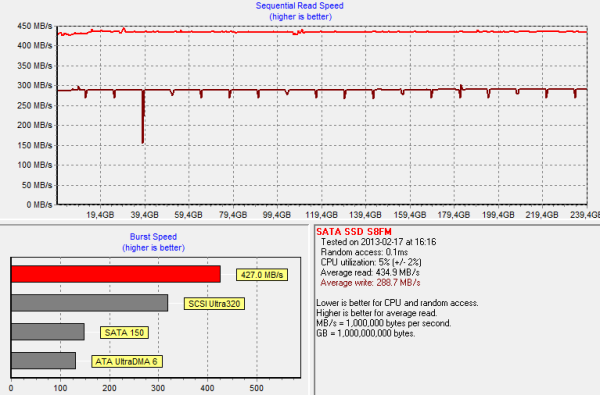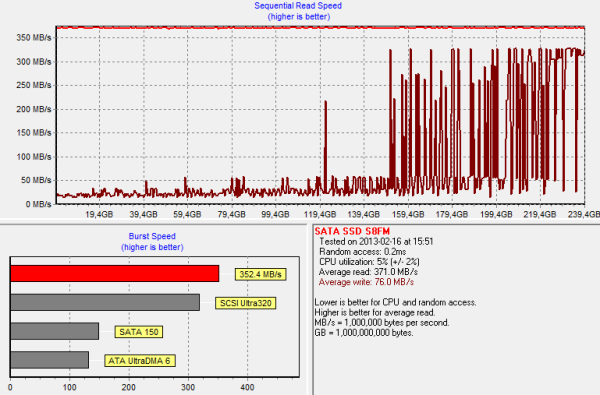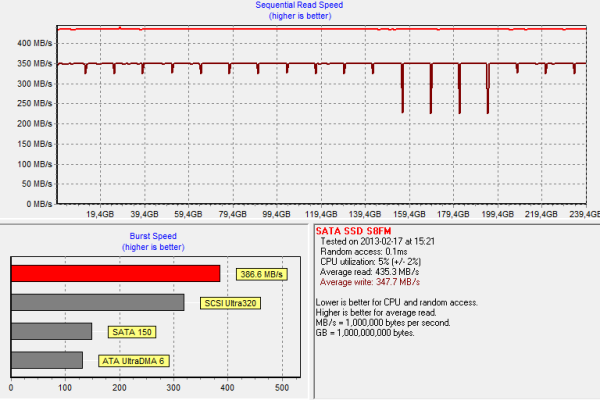MyDigitalSSD BP4 2.5" & mSATA (240GB) Review
by Kristian Vättö on April 3, 2013 11:13 AM ESTPerformance Over Time & TRIM
Our new performance consistency tests give a pretty good indication of performance over time but HD Tach is still a good method for checking TRIM functionality. As usual, I took a secure erased 2.5" BP4 and ran it through HD Tach to get the baseline performance.
Next I filled the drive with sequential data and tortured with 4KB random writes (QD=32, 100% LBA space) for 60 minutes and reran HD Tach.
Performance drops to as low as 20MB/s for the earliest LBAs, which is similar to what the steady state performance looked like in our IO consistency test. Over time, performance gets better as the drive defragments itself and after about 150GB of sequential writes, peak performance gets over 300MB/s. Again, the behavior we're seeing here is related to what we saw in IO consistency tests: there are short peaks and then the drive goes back to do garbage collection.
To test TRIM, I secure erased the drive, filled it and tortured again for 60 minutes to make sure that it's fully fragmented. Then I TRIM'ed all the LBAs:
And TRIM works. Write speed is actually higher than after a secure erase but if we look at IOmeter scores, ~350MB/s is what the BP4 gets. Sometimes drives perform weirdly right after a secure erase. Especially if you're erasing a highly fragmented drive, it may take some minutes for the drive to complete the request, even though it shows up as secure erased.













35 Comments
View All Comments
Kristian Vättö - Wednesday, April 3, 2013 - link
Intel 525 is mSATA only, so the scores there are for mSATA version ;)It really depends on the firmware and hardware you're using. For example, Intel 525 is actually slightly faster than the 520 or 335, which may be due to newer firmware or higher quality NAND, but Plextor M5M is a bit slower than its 2.5" counterpart. A lot depends on the controller/firmware design and how much that relies on parallelism. SandForce does have a minor advantage there because they write less to the NAND due to compression, so you can get away with less (or slower) NAND.
The overall problem with mSATA is that there really aren't that many drives available, especially in the retail market. Most drives are OEM only (like Samsung's) so getting them in for testing is harder.
jhoff80 - Wednesday, April 3, 2013 - link
Aaah, right, I got it confused with the 520. My mistake.DanNeely - Wednesday, April 3, 2013 - link
"Most drives are OEM only (like Samsung's) so getting them in for testing is harder."Sounds like you just need to start voiding warranty stickers on review ultrabooks to stick the drives into the benchmark box after taking pictures of what's inside the shell.
Kristian Vättö - Wednesday, April 3, 2013 - link
Two problems with that:1. Manufacturers don't usually like laptop review samples to be taken into pieces. Having good connections with manufacturers is one of the most important things in this field, so we can't just do what we wish -- we also have to respect manufacturers' requests. Legally all review samples are property of the sender/manufacturer.
2. Laptop and SSD reviews aren't done in the same place; in fact I'm not even on the same continent as the others. Thus it's not possible (or worthwhile) to send the SSD to me for testing, especially as most laptops only have a few week review period. On the other hand, Jarred/Dustin/Vivek could test the drive, assuming they have a modern desktop, but I'm not sure if that's worth it because dealing with different setups always represents some potential issues when it comes to consistency and they already have tons of work to do.
Lets put this in another way: What mSATA SSDs would you like to see tested? I can always ask if the manufacturers can give us review samples, even though the drive may not be available for retail.
msahni - Wednesday, April 3, 2013 - link
Hi there,I am contemplating buying mSATA drives 240GB-256GB range. It is really becoming confusing to purchase a drive considering so many different specs.
My options are
1) Crucial m4 mSATA 256GB http://www.newegg.com/Product/Product.aspx?Item=N8...
2) Plextor M5M 256GB http://www.newegg.com/Product/Product.aspx?Item=N8...
3) Intel SSD 525 240GB http://www.newegg.com/Product/Product.aspx?Item=N8...
4) Mushkin Enhanced Atlas 240GB http://www.newegg.com/Product/Product.aspx?Item=N8...
I have not been able to get a head to head comparison of the drives anywhere. Most of the tech spec shootouts are of these drives against SSDs or older models.
Could you please advise which of these drives in your opinion would be the most eligible buy in a real world consumer scenario..
Cheers....
MyDigitalSSD - Thursday, April 4, 2013 - link
Visit Amazon and search bp4 240gb mSATA there are a few still left in stock. Best deal on one right now.Kristian Vättö - Thursday, April 4, 2013 - link
I would pick either Crucial or Plextor. The Plextor one is a bit faster and Plextor also has very good reputation when it comes to reliability, although in this case the Crucial is "more proven" as it's been out longer. Both are good choices, so this is a matter of personal preference.LouisPR - Wednesday, April 3, 2013 - link
Happy to see a review about the BP4. I own it since mid February if I'm not mistaken and it's awesome!Vepsa - Wednesday, April 3, 2013 - link
I really like the price of $160 for the 240GB drive. Seriously considering getting one now and a second later for RAID0.jamyryals - Wednesday, April 3, 2013 - link
I got one of the 256GB Samsung 830 SSDs for $160. It was a great price for a drive on sale. I'm very happy to see retail starting at that price for a comparable drive. Time to wait and see what BP4's reliability will be like before I jump in on a nicely priced ~500GB.